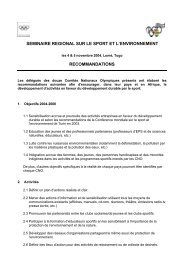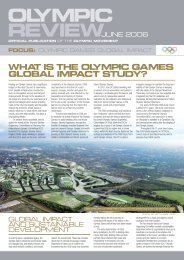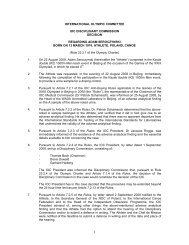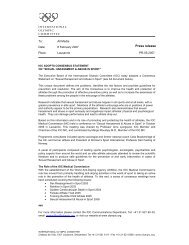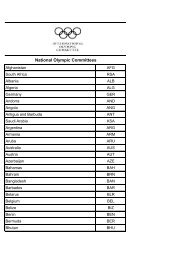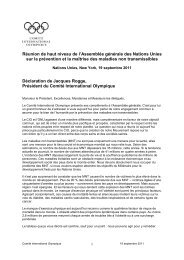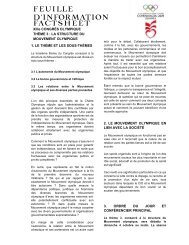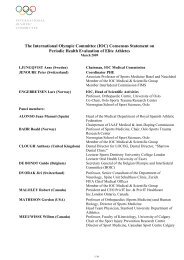7th World Conference on Sport and the Environment - International ...
7th World Conference on Sport and the Environment - International ...
7th World Conference on Sport and the Environment - International ...
Create successful ePaper yourself
Turn your PDF publications into a flip-book with our unique Google optimized e-Paper software.
Report<br />
4.10.2. <strong>Sport</strong> <strong>and</strong> sustainable compliance<br />
Auret van Heerden, President <strong>and</strong> CEO, Fair Labor Associati<strong>on</strong><br />
The famous ec<strong>on</strong>omist Milt<strong>on</strong> Friedman made <strong>the</strong> classic statement that “<strong>the</strong> social resp<strong>on</strong>sibility of<br />
business is to make profits” <strong>and</strong> <strong>on</strong>e could apply that logic to sport <strong>and</strong> say that <strong>the</strong> social resp<strong>on</strong>sibility<br />
of sport is to promote sport. That is indeed a valid <strong>and</strong> valuable thing in itself. However, any business or<br />
sporting activity takes place in a specific social c<strong>on</strong>text that cannot be ignored. (I use <strong>the</strong> term “social” in<br />
its broadest sense here <strong>and</strong> include <strong>the</strong> envir<strong>on</strong>ment). If that social c<strong>on</strong>text is badly regulated business<br />
or sporting activity will inevitably be affected. In <strong>the</strong> case of business, many companies found that<br />
<strong>the</strong>ir exclusive focus <strong>on</strong> profits meant that <strong>the</strong>y overlooked key social factors that subsequently had a<br />
negative impact <strong>on</strong> <strong>the</strong>ir business. To take a topical example, a business manufacturing in a country<br />
where product safety regulati<strong>on</strong>s are not properly developed or enforced may find that <strong>the</strong>ir goods are<br />
defective <strong>and</strong> have to be recalled, resulting in additi<strong>on</strong>al costs, potential legal liability <strong>and</strong> damage to <strong>the</strong>ir<br />
reputati<strong>on</strong>.<br />
C<strong>on</strong>sumers, in particular, want to be able to rely <strong>on</strong> <strong>the</strong> integrity of <strong>the</strong>ir favorite br<strong>and</strong>s <strong>and</strong> so companies<br />
who cannot be sure of <strong>the</strong> regulatory envir<strong>on</strong>ment need to take additi<strong>on</strong>al measures to ensure that <strong>the</strong>ir<br />
products meet up to market expectati<strong>on</strong>s. This issue has been magnified in recent years by a number of<br />
factors. Firstly, more <strong>and</strong> more products are now produced in global supply chains <strong>and</strong> this increases <strong>the</strong><br />
risk that <strong>on</strong>e or more of <strong>the</strong> links in that supply chain is located in an unregulated jurisdicti<strong>on</strong> <strong>and</strong> may not<br />
comply with a key regulati<strong>on</strong> or st<strong>and</strong>ard. Sec<strong>on</strong>dly, <strong>the</strong> length of <strong>the</strong> supply chains makes it very hard<br />
for <strong>the</strong> buyer to have visibility over all <strong>the</strong> suppliers involved. Thirdly, <strong>the</strong> amount of informati<strong>on</strong> available<br />
to c<strong>on</strong>sumers is greater than ever before <strong>and</strong> <strong>the</strong>y may well find out about a product defect through <strong>the</strong><br />
media or o<strong>the</strong>r sources. Once c<strong>on</strong>sumer c<strong>on</strong>fidence in a product or a source of products is shaken it is<br />
very hard to restore.<br />
Hence even businesses who follow Milt<strong>on</strong> Friedman’s dictum <strong>and</strong> focus <strong>on</strong>ly <strong>on</strong> profits so<strong>on</strong> find that<br />
<strong>the</strong>ir pursuit of profits cannot be sustained without taking into c<strong>on</strong>siderati<strong>on</strong> social factors. If <strong>the</strong> public<br />
agencies cannot ensure an acceptable or effective degree of social regulati<strong>on</strong> <strong>the</strong>n business may well<br />
need to step in <strong>and</strong> make o<strong>the</strong>r arrangements to provide basic social goods. The extractive industries<br />
have l<strong>on</strong>g been aware of this <strong>and</strong> have <strong>the</strong>mselves undertaken <strong>the</strong> provisi<strong>on</strong> of social goods such as<br />
roads, clinics <strong>and</strong> schools. Since oil or mining companies often operate in remote areas where public<br />
infrastructure <strong>and</strong> services do not reach <strong>the</strong>y have to deliver such services <strong>the</strong>mselves just to ensure <strong>the</strong>ir<br />
basic operati<strong>on</strong>s. The need for a private actor to deliver public goods is not as obvious when companies<br />
operate in cities but <strong>the</strong> same implicati<strong>on</strong>s exist if <strong>the</strong> c<strong>on</strong>text is not well regulated. Any company or<br />
organizati<strong>on</strong> <strong>the</strong>refore has to ask itself a few basic questi<strong>on</strong>s about <strong>the</strong> c<strong>on</strong>text in which it operates. What<br />
are <strong>the</strong> key social issues that may affect my activities? Can I rely <strong>on</strong> <strong>the</strong> public agencies resp<strong>on</strong>sible for<br />
managing those issues? If not, what can I, as a private actor, do to ensure that <strong>the</strong>y are managed so that<br />
I can protect <strong>the</strong> integrity of my product <strong>and</strong> my reputati<strong>on</strong> as a producer? In this regard any sporting<br />
organizati<strong>on</strong> could be seen as a producer <strong>and</strong> sporting activity as <strong>the</strong>ir product so <strong>the</strong> same questi<strong>on</strong>s<br />
need to be asked.<br />
If <strong>the</strong> answer to any of <strong>the</strong> questi<strong>on</strong>s above is “no” <strong>the</strong>n <strong>the</strong> enterprise or organizati<strong>on</strong> needs to take<br />
additi<strong>on</strong>al steps ensure <strong>the</strong> viability <strong>and</strong> sustainability of <strong>the</strong>ir activities. Many companies already do this<br />
in respect of product quality. They have quality st<strong>and</strong>ards <strong>and</strong> c<strong>on</strong>duct quality c<strong>on</strong>trols in order to ensure<br />
that <strong>the</strong>ir suppliers comply with those st<strong>and</strong>ards. In some c<strong>on</strong>texts that approach has to be extended<br />
to o<strong>the</strong>r issues as well <strong>and</strong> companies have used <strong>the</strong> same approach – <strong>the</strong>y set precise performance<br />
requirements <strong>and</strong> audit to ensure compliance. Where <strong>the</strong>y find n<strong>on</strong>-compliance <strong>the</strong>y define corrective<br />
acti<strong>on</strong> plans to address it.<br />
Take <strong>the</strong> example of child labour. In some developing countries widespread poverty results in child<br />
labour <strong>and</strong> any ec<strong>on</strong>omic or social activity in that society runs <strong>the</strong> risk of being affected by child labour.<br />
This has been <strong>the</strong> case in <strong>the</strong> Sialkot area of Pakistan which has l<strong>on</strong>g been a major producer of sporting<br />
goods, in particular soccer balls. Clearly no company or social organizati<strong>on</strong> can eliminate poverty <strong>and</strong><br />
child labour but at <strong>the</strong> same time <strong>the</strong>y cannot ignore <strong>the</strong> fact <strong>and</strong> <strong>the</strong> risk so <strong>the</strong>y need to be proactive<br />
<strong>and</strong> take steps to prevent it entering into <strong>the</strong>ir supply chain. In additi<strong>on</strong> to preventi<strong>on</strong>, <strong>the</strong>y need to be<br />
m<strong>on</strong>itoring <strong>on</strong> an <strong>on</strong>going basis to ensure that <strong>the</strong> preventive measures are working <strong>and</strong> where <strong>the</strong>y do<br />
find n<strong>on</strong>-compliance with <strong>the</strong>ir child labour st<strong>and</strong>ards <strong>the</strong>y need to set up a corrective acti<strong>on</strong> plan to<br />
remedy <strong>the</strong> problem. The implementati<strong>on</strong> of that plan will almost certainly involve skills that <strong>the</strong> business<br />
or sports organizati<strong>on</strong> does not possess <strong>and</strong> so <strong>the</strong>y should partner with o<strong>the</strong>r groups who specialize in<br />
that area. A good example of this can be found in <strong>the</strong> resp<strong>on</strong>se of <strong>the</strong> sports community to <strong>the</strong> situati<strong>on</strong><br />
in Sialkot. The <str<strong>on</strong>g>World</str<strong>on</strong>g> Federati<strong>on</strong> of <strong>Sport</strong>ing Good Industry (WFSGI), <strong>the</strong> ILO, UNICEF <strong>and</strong> some NGOs<br />
<str<strong>on</strong>g>7th</str<strong>on</strong>g> <str<strong>on</strong>g>World</str<strong>on</strong>g> <str<strong>on</strong>g>C<strong>on</strong>ference</str<strong>on</strong>g> <strong>on</strong> <strong>Sport</strong> <strong>and</strong> <strong>the</strong> Envir<strong>on</strong>ment<br />
Internati<strong>on</strong>al Cooperati<strong>on</strong> <strong>and</strong> Development Dept.<br />
Page 193/256




